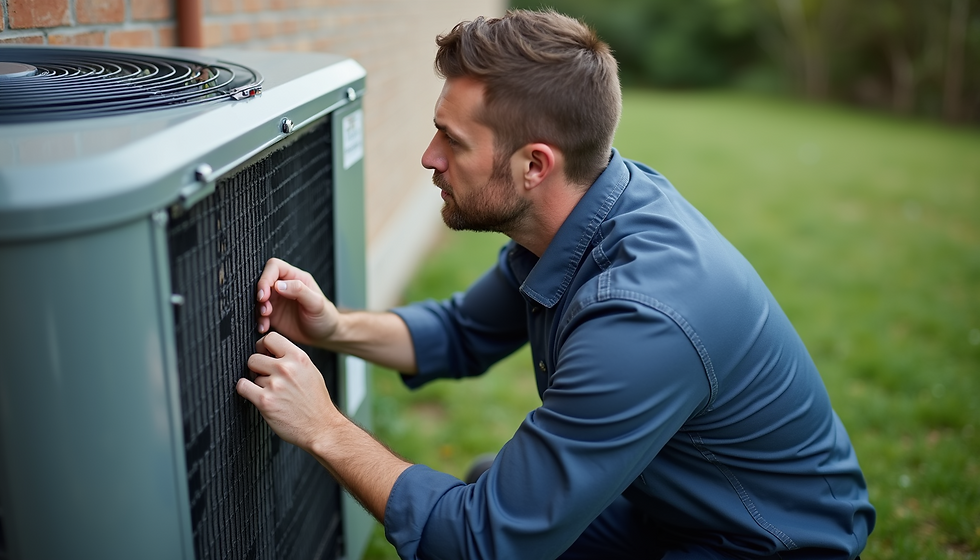The Impact of North Florida Humidity on Your Home's Electrical Equipment Insights from a Jacksonville Electrician
- Thompson Electric & Air

- Jun 20
- 4 min read
Living in North Florida offers many perks, from beautiful sunny beaches to lush, green landscapes. However, there's one critical aspect that often goes unnoticed: the high humidity levels that can negatively affect your electrical equipment. Understanding how humidity impacts electrical systems is vital for homeowners looking to preserve their investments and maintain safety. In this blog post, we’ll explore the various ways humidity can harm your home's electrical items, with insights from an experienced Jacksonville electrician.

Let's start with Understanding Humidity in North Florida
North Florida experiences a subtropical climate, characterized by high humidity levels, especially during summer months. Humidity measures water vapor in the air and can create environmental challenges for your home.
During peak summer, the average humidity levels can reach around 75%, causing significant wear on electrical devices, circuits, and appliances. As a homeowner, recognizing these risks can help you take preventive actions to safeguard your property.
What are The Dangers of High Humidity on Electrical Equipment
1. Moisture and Corrosion
High humidity can lead to moisture accumulation, which causes corrosion. Metal components in electrical items—like connectors and circuit boards—are particularly vulnerable. A study has shown that over 50% of electrical failures can be traced back to corrosion-related issues. Once corrosion occurs, malfunction or complete failure of electrical devices is likely.

Preventive Measures:
Dehumidifiers: Install a dehumidifier to maintain humidity levels below 50%, reducing moisture in the air.
Sealed Electrical Connectors: Use moisture-rated sealed electrical connectors to protect against corrosion.
2. Electrical Shorts
Increased moisture increases the risk of electrical shorts. Water and electricity don’t mix, and when moisture infiltrates electrical systems, the chance of shorts escalates dramatically. This can result in flickering lights, tripped breakers, and in severe cases, electrical fires.
Preventive Measures:
Regular Inspections: Schedule yearly inspections with a qualified Jacksonville electrician to ensure your electrical systems are in good shape.
Proper Ventilation: Maintain ventilation in areas with electrical installations to help moisture escape.
3. Impact on Appliances
High humidity can force your appliances to work harder, leading to a decrease in their lifespan. For example, appliances like refrigerators can develop moisture inside, impacting their electrical systems. This can lead to inefficiencies and costly repairs. Appliances running at 20% over their intended capacity due to excess moisture can lead to breakdowns sooner than expected.
Preventive Measures:
Maintain Appliances: Consistently clean and inspect your appliances for moisture buildup.
Use Exhaust Fans: Install exhaust fans in kitchens to vent moisture outside during cooking.
The Role of Proper Insulation to protect your electrical equipment
1. The Importance of Proper Insulation
Proper insulation is crucial in how humidity affects electrical equipment. Homes lacking adequate insulation can trap moisture, creating a perfect environment for mold. According to studies, homes with poor insulation can experience up to 30% more humidity retention.
Preventive Measures:
Insulate Areas: Insulate attics, basements, and crawl spaces to limit moisture retention.
Check for Leaks: Regularly inspect for moisture entry points around windows and doors.
2. Mold Growth and Its Electrical Threat

Mold thrives in humid conditions and can harm your electrical systems. It can grow around outlets and switches, damaging wiring and posing health risks. According to the CDC, mold exposure can lead to respiratory issues, making it essential to keep electrical areas mold-free.
Preventive Measures:
Keep Dry Areas Dry: Address any leaks or water seepage quickly.
Mold Inspection: Consider conducting regular mold inspections, especially near electrical installations.
How you can Protect Your Home's Electrical Systems
1. Surge Protection
High humidity can create fluctuating electrical currents, risking damage to sensitive electrical items. North Florida's storms often result in unexpected power surges, which can be mitigated by investing in surge protection devices.
Preventive Measures:
Install Whole-House Surge Protectors: A whole-house surge protector offers secure protection for all electrical items.
Use Surge Protectors for Appliances: Protect valuable appliances with dedicated surge protectors to ensure their safety.
2. Choosing the Right Electrician
Selecting the right electrician is vital for maintaining your home’s electrical systems in high humidity areas. A qualified local expert understands the unique challenges of North Florida's climate and can offer tailored solutions.
Preventive Measures:
Research Local Electricians: Look for licensed electricians with experience in residential services specific to your needs.
Seek Reviews: Check reviews to find reputable electricians knowledgeable about the local humidity effects on electrical systems.
Taking Charge of Your Home’s Safety
The high humidity levels in North Florida pose serious threats to your home's electrical items, leading to problems like corrosion, electrical shorts, and appliance failures. By actively understanding these challenges and taking preventive measures, you can protect your investments and ensure the longevity of your electrical systems.
Regular inspections, efficient insulation, and moisture control are essential for safeguarding your home. Don't wait for issues to arise; take steps now to maintain a comfortable and safe living environment for you and your family.
Addressing these concerns can make a significant difference. Work with local professionals to navigate Florida's unique climate challenges and ensure your home remains a safe haven for years to come.







Comments